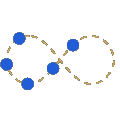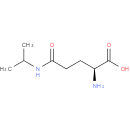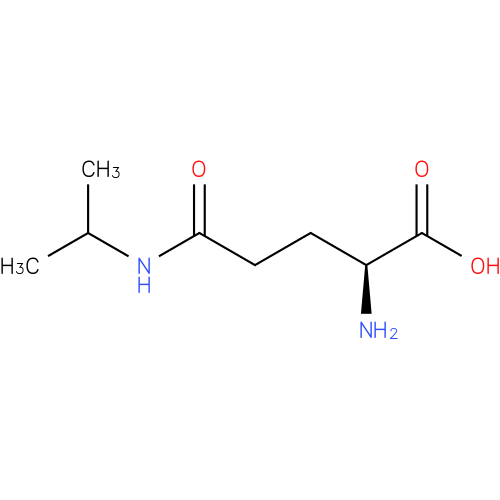|
Record Information |
|---|
| Version |
1.0 |
|---|
| Update Date |
1/22/2018 11:54:54 AM |
|---|
|
Metabolite ID | PAMDB100020 |
|---|
|
Identification |
|---|
| Name: |
N-isopropyl-L-glutamine |
|---|
| Description: | A N5-alkylglutamine where the alkyl group is isopropyl. |
|---|
|
Structure |
|
|---|
| Synonyms: | - γ-glutamyl-isopropylamide
- N5-isopropyl-L-glutamine
|
|---|
|
Chemical Formula: |
C8H16N2O3 |
|---|
| Average Molecular Weight: |
188.2242 |
|---|
| Monoisotopic Molecular
Weight: |
188.116 |
|---|
| InChI Key: |
CABXGBMKSVRWOG-LURJTMIESA-N |
|---|
| InChI: | InChI=1S/C8H16N2O3/c1-5(2)10-7(11)4-3-6(9)8(12)13/h5-6H,3-4,9H2,1-2H3,(H,10,11)(H,12,13)/t6-/m0/s1 |
|---|
| CAS
number: |
Not Available |
|---|
| IUPAC Name: | N-propan-2-yl-L-glutamine |
|---|
|
Traditional IUPAC Name: |
Not Available |
|---|
| SMILES: | CC(C)NC(=O)CC[C@H](N)C(O)=O |
|---|
|
Chemical Taxonomy |
|---|
|
Taxonomy Description | This compound belongs to the class of organic compounds known as glutamine and derivatives. These are compounds containing glutamine or a derivative thereof resulting from reaction of glutamine at the amino group or the carboxy group, or from the replacement of any hydrogen of glycine by a heteroatom. |
|---|
|
Kingdom |
Organic compounds |
|---|
| Super Class | Organic acids and derivatives |
|---|
|
Class |
Carboxylic acids and derivatives |
|---|
| Sub Class | Amino acids, peptides, and analogues |
|---|
|
Direct Parent |
Glutamine and derivatives |
|---|
| Alternative Parents |
|
|---|
| Substituents |
- Glutamine or derivatives
- Alpha-amino acid
- L-alpha-amino acid
- Fatty amide
- N-acyl-amine
- Fatty acyl
- Fatty acid
- Carboxamide group
- Carboxylic acid salt
- Amino acid
- Secondary carboxylic acid amide
- Carboxylic acid
- Monocarboxylic acid or derivatives
- Primary amine
- Organooxygen compound
- Organonitrogen compound
- Hydrocarbon derivative
- Organic nitrogen compound
- Primary aliphatic amine
- Organic oxide
- Organopnictogen compound
- Organic oxygen compound
- Carbonyl group
- Amine
- Organic salt
- Organic zwitterion
- Aliphatic acyclic compound
|
|---|
| Molecular Framework |
Aliphatic acyclic compounds |
|---|
| External Descriptors |
- N(5)-alkyl-L-glutamine (CHEBI:85891)
|
|---|
|
Physical Properties |
|---|
| State: |
Not Available |
|---|
| Charge: | 0 |
|---|
|
Melting point: |
Not Available |
|---|
| Experimental Properties: |
Not Available |
|---|
| Predicted Properties |
|
|---|
|
Biological Properties |
|---|
| Cellular Locations: |
Not Available |
|---|
| Reactions: | |
|---|
|
Pathways: |
|
|---|
|
Spectra |
|---|
| Spectra: |
Not Available |
|---|
|
References |
|---|
| References: |
- de Azevedo Wäsch SI, van der Ploeg JR, Maire T, Lebreton A, Kiener A,
Leisinger T. Transformation of isopropylamine to L-alaninol by Pseudomonas sp.
strain KIE171 involves N-glutamylated intermediates. Appl Environ Microbiol. 2002
May;68(5):2368-75. Pubmed: 11976110
|
|---|
| Synthesis Reference: |
Not Available |
|---|
| Material Safety Data Sheet (MSDS) |
Not Available |
|---|
|
Links |
|---|
| External Links: |
|
|---|


